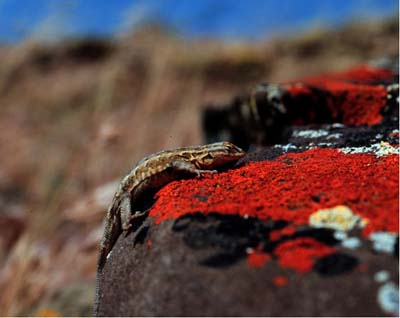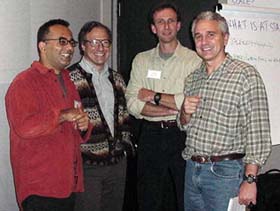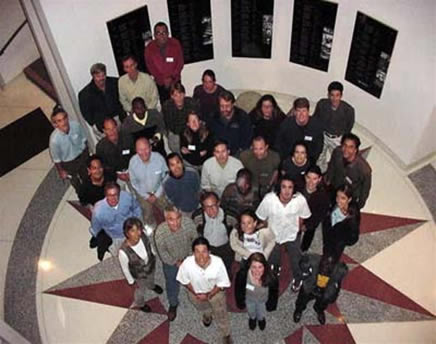
Center for Tropical Research November 2002 Newsletter
CTR Workshop on Rainforest Diversification and Conservation
For the past three years, CTR researchers and collaborating scientists have been working on an NSF-funded project to examine the importance of evolutionary processes in the generation and maintenance of biodiversity in tropical ecosystems. These forces seem especially strong along environmental gradients, such as those that exist between savannah and rainforest in West Africa and along gradients in the Andes.
On November 8th and 9th, CTR convened a gathering at UCLA to discuss the implications of the research findings for conservationof tropical ecosystems. Over forty people attended, including collaborating scientists from Boston University, UC Berkeley, University of Queensland, University of Cocody (Cote d’Ivoire), and JPL/NASA. Scientists gave short presentations on their findings, covering a broad spectrum of taxa (from frogs and lizards to birds and bats). Evidence of microevolutionary change was found in each of these taxa in a variety of morphological and behavioral traits, as well as in molecular genetic structure. Parallel work in Australia, West Africa, and Ecuador showed concordant patterns, indicating that many of the evolutionary processes responsible for generating tropical diversity are similar across continents.
In order to better understand the conservation implications of the research, and to maximize the impact of the research for conservation planning and policy, CTR invited representatives from nongovernmental environmental organizations and the donor community. Representatives from WWF (West Africa), Jatun Sacha (Ecuador), The Nature Conservancy, Environmental Defense and the Gordon and Betty Moore Foundation attended and provided valuable insight and an on-the-ground, practitioner’s perspective for how the research can be applied to conservation efforts. A consensus was reached that evolutionary processes needed to be considered in addition to biodiversity ‘hotspots’, and that ‘processes needed to be put on the map’.
  |
| Center for Tropical Research workshop participants |
Lizard Wizard
A study by CTR postdoctoral researcher, Dr. Ryan Calsbeek, created quite a stir in the popular media upon publication in the Proceedings of the National Academy of Science on November 5th, 2002. In Ryan’s words:
“My work on side-blotched lizards shows that female mate choice is about both the male¹s territory and his genes. Usually, large males and the best territory go hand in hand because larger males outcompete the smaller ones for the best bachelor pads. However, by experimentally manipulating territory quality, I was able to differentiate between female preferences for males and their resources. My colleague Barry Sinervo and I rearranged the territories of a population of side-blotched lizards, Ula stansburiana. We took rocks good for sheltering and sunning from the territories controlled by larger males and placed them in the territories of smaller males. We then recorded where the females chose to settle and with whom they mated. The females preferred to set up nests in the better territories, even if a smaller male controlled the area. The females, however, also mated with larger males outside of their chosen territory. We used the progeny’s DNA to determine paternity, and we found that most male offspring were larger, sired by the larger lizard. Female offspring tended to be smaller and sired by the smaller territory owner. We show that this selective sperm utilization gives the female ultimate control over her mating choice and outcome, thus cementing female mate choice as a powerful form of sexual selection that shapes species over time.”
The Associated Press has picked up the story and it can now be seen on CNN, MSNBC, New York Times, L.A. Times, Washington Post, Discovery Chanel, NPR, among other places. Please visit the this link for more details.
